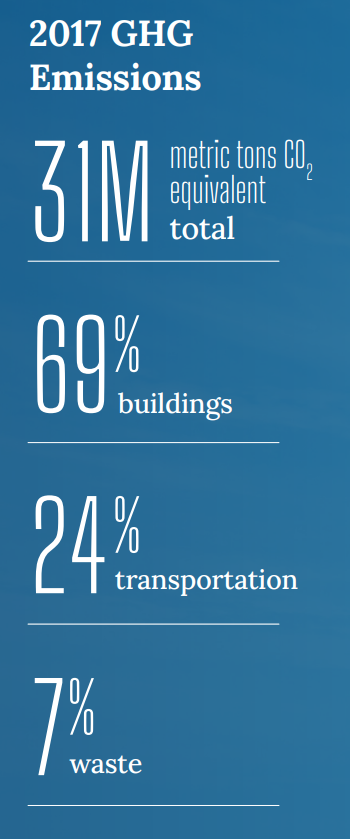Electrify Chicago
An independent tool for viewing City of Chicago building data
According to the
2022 Chicago Climate Action Plan,
69% of Chicago's emissions come from buildings, making
building emissions our biggest challenge and our biggest opportunity as a city
to tackle climate change. At Electrify Chicago, we showcase building performance using
publicly available data supplemented by community-submitted photographs and building
owners.
Start by looking at Chicago's buildings with the highest greenhouse gas intensity i.e. emissions per square foot. Large, efficient, buildings can perform much better than very inefficient small buildings on this metric.
New Article
📰 $30 Million In Missed Fines
The City Of Chicago failed to collect $30 million in potential fines from the building benchmarking ordinance, reducing transparency and accountability.
Legislative update! 🎉
As of late January 2024, legislation is being introduced to require new use more efficient forms of water and space heating, via the Clean And Affordable Buildings Ordinance (CABO), which will reduce the number of highly polluting and inefficient buildings that end up on this site.
If you're in Chicago,
write to your alderman to support the CABO!
Chicago Buildings by Greenhouse Gas Intensity
Note: Data includes large Chicago buildings with data from 2022, unless explicitly stated otherwise.
Note: This data only includes buildings whose emissions are reported
under the
Chicago Energy Benchmarking Ordinance. According to the City “As of 2016,
this list includes all commercial, institutional, and residential buildings larger than
50,000 square feet.” This dataset is also then filtered to only buildings with
reported emissions > 1,000 metric tons CO2 equivalent.
The latest year of data is from 2022, but we update the site regularly when new data is available, and some buildings may have failed to report that year, and only have older data available.
| Property Name / address | Primary Property Type |
Greenhouse Gas Intensity (kg CO2 eq./sqft) |
Total Greenhouse Emissions (metric tons CO2 eq.) |
|---|---|---|---|
|
7430 S ROCKWELL ST
7430 S ROCKWELL ST
| Senior Living Community | 5.4 kg/sqft
Lowest 31%
| 422 tons
Lowest 19%
|
|
3600 3612 W FRANKLIN BLVD
3600 3612 W FRANKLIN BLVD
| Multifamily Housing | 5.4 kg/sqft
Lowest 31%
| 340 tons
Lowest 12%
|
|
2111 S Wabash Ave
2111 S Wabash Ave
| Multifamily Housing | 5.3 kg/sqft
Lowest 29%
| 1,468 tons
Highest 32%
|
|
2773 N HAMPDEN CT
2773 N HAMPDEN CT
| Multifamily Housing | 5.3 kg/sqft
Lowest 29%
| 535 tons
Lowest 29%
|
|
Rosenwald Hall
1101-11 East 58th Street
| Office | 5.3 kg/sqft
Lowest 29%
| 339 tons
Lowest 11%
|
|
465 N Park Dr
465 N Park Dr
| Multifamily Housing | 5.3 kg/sqft
Lowest 29%
| 2,869 tons
Highest 15%
|
|
1001 South State
🕰️
1001 S STATE ST
| Multifamily Housing | 5.3 kg/sqft | 2,707 tons |
|
The Montclare Supportive Living Community
4339 W 18TH PL
| Senior Living Community | 5.3 kg/sqft
Lowest 29%
| 440 tons
Lowest 20%
|
|
1325 N WELLS ST
1325 N WELLS ST
| Multifamily Housing | 5.3 kg/sqft
Lowest 29%
| 325 tons
Lowest 10%
|
|
5924 N Lincoln
🕰️
5924 N Lincoln Ave
| Multifamily Housing | 5.3 kg/sqft | 265 tons |
|
Reside by Irving Park
🕰️
725 W Irving Park Rd
| Multifamily Housing | 5.3 kg/sqft | 334 tons |
|
2545 Fitch Condominiums Association
🕰️
2545 W. Fitch Ave.
| Multifamily Housing | 5.3 kg/sqft | 275 tons |
|
Harris Theater for Music and Dance
205 E Randolph St
| Performing Arts | 5.3 kg/sqft
Lowest 29%
| 754 tons
Lowest 43%
|
|
Ryerson Laboratory/ Eckhart Hall
1118 1132 E 58th St
| Laboratory | 5.3 kg/sqft
Lowest 29%
| 359 tons
Lowest 13%
|
|
Zapata Elementary Academy, Emiliano -CPS
(CPS)
2730 S Kostner Ave
| K-12 School | 5.3 kg/sqft
Lowest 29%
| 576 tons
Lowest 32%
|
Data Source:
Chicago Energy Benchmarking Data
